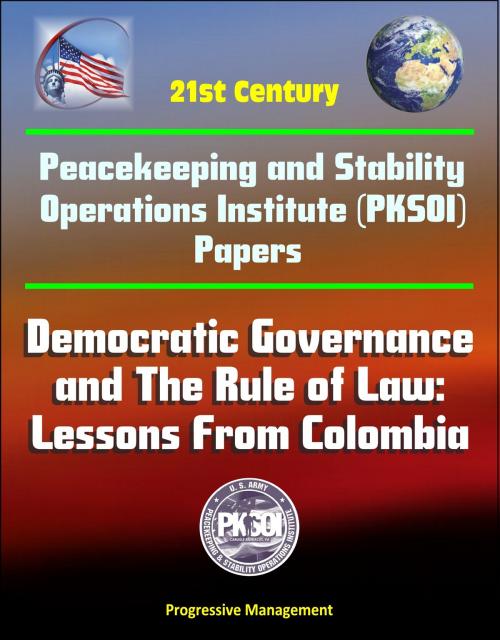21st Century Peacekeeping and Stability Operations Institute (PKSOI) Papers - Democratic Governance and The Rule of Law: Lessons From Colombia
Nonfiction, Social & Cultural Studies, Political Science, Government, Democracy| Author: | Progressive Management | ISBN: | 9781311747617 |
| Publisher: | Progressive Management | Publication: | November 28, 2013 |
| Imprint: | Smashwords Edition | Language: | English |
| Author: | Progressive Management |
| ISBN: | 9781311747617 |
| Publisher: | Progressive Management |
| Publication: | November 28, 2013 |
| Imprint: | Smashwords Edition |
| Language: | English |
The 2009 Failed States Index, a collaborative venture between Foreign Policy and The Fund for Peace, identifies many nations as being in danger of becoming failed states — in fact, two-thirds of the world's states are critical, borderline, or in danger of becoming just that. Failed states do not possess the necessary conditions to have truly sovereign governments that meet the needs of their populations.
Colombia garnered a rating of 89 on the 2009 Failed States Index, just below that of Kyrgyzstan. It has experienced conflict for decades and as Dr. Gabriel Marcella observed, was a "paradigm for a failing state" in that it was replete with terrorism, kidnapping, murder, corruption, and general lawlessness. But today it is much safer through the imposition of the Rule of Law.
Dr. Marcella addresses the rule of law and its impact on Colombia. The Peacekeeping and Stability Operations Institute and the Strategic Studies Institute are pleased to offer this monograph as part of an international conversation regarding the prevention of failed states and the maintenance and improvement of states that have not yet degenerated to that level.
Colombia has experienced conflict for decades. In the 1990s it was a paradigm of the failing state, beset with all manner of troubles: terrorism, kidnapping, murder, drug trafficking, corruption, an economic downturn of major scope, general lawlessness, and brain drain. Today the country is much safer, and the agents of violence are clearly on the defensive. Nonetheless, much work lies ahead to secure the democratic system. Security and the rule of law are fundamental to the task. As the monopoly over the legitimate use of force is established, democratic governance also needs the architecture of law: ministry of justice, courts, legislative scrutiny, law enforcement agencies, regulatory bodies, public defenders, police, correctional system, legal statutes, contracts, university level academic education to train lawyers, judges, and investigators, along with engagement with civil society to promote a culture of lawfulness. Security without the rule of law puts a society at risk of falling into a Hobbesian hell.
This paper explores the impact of revolutionary changes in the administration of law on governance in Colombia. While fighting a long and difficult war against terrorists and narcotics traffickers, Colombia began converting its judicial system from the Roman law based inquisitorial system to an accusatory system. The United States has assisted with money and advice as part of its overall support program under Plan Colombia. The changes are already showing remarkable results in expediting criminal cases through the courts and in making the legal process more accessible to the people, thereby restoring confidence in the badly battered judicial system. The lessons to be drawn are important for statesmen throughout the world because Colombia may very well be the best ongoing laboratory for democratic state building. For example, rule of law programs cannot be sustained without adequate security, which must also be established within legal norms. The host country must design, implement, and make the sacrifices for its own program of reform and institution building in order for the effort to take deep roots in the political culture. Moreover, the primacy of legitimacy and the rule of law must be a central component of instruction, doctrine, and education and planning for post-conflict reconstruction governance activities. Therefore, Colombia is a paradigm that needs to be extensively studied by strategists looking for wisdom in the nexus between security, the rule of law, and democratic governance.
The 2009 Failed States Index, a collaborative venture between Foreign Policy and The Fund for Peace, identifies many nations as being in danger of becoming failed states — in fact, two-thirds of the world's states are critical, borderline, or in danger of becoming just that. Failed states do not possess the necessary conditions to have truly sovereign governments that meet the needs of their populations.
Colombia garnered a rating of 89 on the 2009 Failed States Index, just below that of Kyrgyzstan. It has experienced conflict for decades and as Dr. Gabriel Marcella observed, was a "paradigm for a failing state" in that it was replete with terrorism, kidnapping, murder, corruption, and general lawlessness. But today it is much safer through the imposition of the Rule of Law.
Dr. Marcella addresses the rule of law and its impact on Colombia. The Peacekeeping and Stability Operations Institute and the Strategic Studies Institute are pleased to offer this monograph as part of an international conversation regarding the prevention of failed states and the maintenance and improvement of states that have not yet degenerated to that level.
Colombia has experienced conflict for decades. In the 1990s it was a paradigm of the failing state, beset with all manner of troubles: terrorism, kidnapping, murder, drug trafficking, corruption, an economic downturn of major scope, general lawlessness, and brain drain. Today the country is much safer, and the agents of violence are clearly on the defensive. Nonetheless, much work lies ahead to secure the democratic system. Security and the rule of law are fundamental to the task. As the monopoly over the legitimate use of force is established, democratic governance also needs the architecture of law: ministry of justice, courts, legislative scrutiny, law enforcement agencies, regulatory bodies, public defenders, police, correctional system, legal statutes, contracts, university level academic education to train lawyers, judges, and investigators, along with engagement with civil society to promote a culture of lawfulness. Security without the rule of law puts a society at risk of falling into a Hobbesian hell.
This paper explores the impact of revolutionary changes in the administration of law on governance in Colombia. While fighting a long and difficult war against terrorists and narcotics traffickers, Colombia began converting its judicial system from the Roman law based inquisitorial system to an accusatory system. The United States has assisted with money and advice as part of its overall support program under Plan Colombia. The changes are already showing remarkable results in expediting criminal cases through the courts and in making the legal process more accessible to the people, thereby restoring confidence in the badly battered judicial system. The lessons to be drawn are important for statesmen throughout the world because Colombia may very well be the best ongoing laboratory for democratic state building. For example, rule of law programs cannot be sustained without adequate security, which must also be established within legal norms. The host country must design, implement, and make the sacrifices for its own program of reform and institution building in order for the effort to take deep roots in the political culture. Moreover, the primacy of legitimacy and the rule of law must be a central component of instruction, doctrine, and education and planning for post-conflict reconstruction governance activities. Therefore, Colombia is a paradigm that needs to be extensively studied by strategists looking for wisdom in the nexus between security, the rule of law, and democratic governance.















